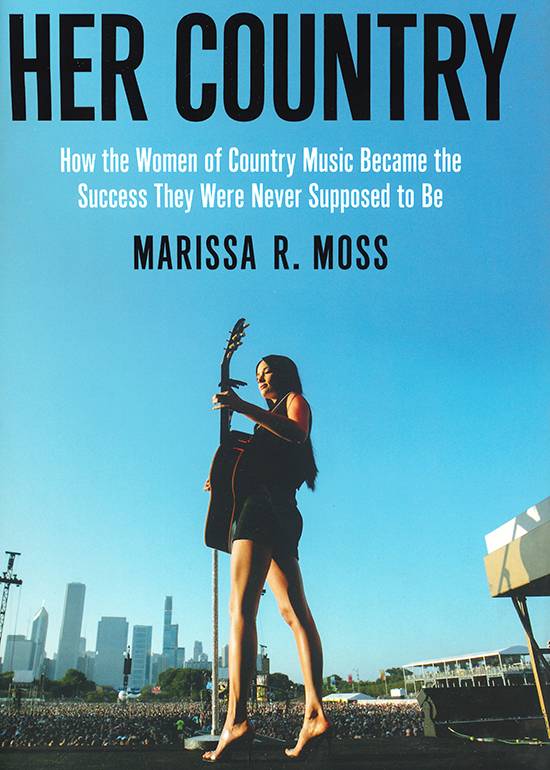Man, I Feel Like a Woman Dismantling Systematic Inequality

Her Country: How the Women of Country Music Became the Success They Were Never Supposed to Be
by Marissa R. Moss
New York: Henry Holt and Company, 2022.
297 pp. $28.99 hardcover.
Reviewed by
Amy Bushong
Marissa R. Moss’s debut is a country music masterpiece and an ode to rebellious women everywhere, especially to those born and raised in the Lone Star State. This fun, heart-warming, nostalgia-inducing, and occasionally infuriating work exposes the systematic exclusion of women in the country music industry, from Music Row executives in Nashville to the dictation given to radio stations around the country to never play more than two female artists in a row. A veteran at tackling gender inequality in her work, Moss expertly navigates the present oppressive elements in the industry while retaining the agency of her subjects.
The book is loosely structured around the careers of Kacey Musgraves, Maron Morris, and Mickey Guyton, yet that does not limit the cast of characters present within the work. Frequent cameos of country music legends such as Dolly Parton, Shania Twain, Loretta Lynn, and more are peppered throughout, with many of these women dominating the first chapters of the book. Moss provides ample context for the trajectory of their careers, focusing heavily on how they thwarted expectations set by music execs and the reprisals that followed. A large part of the book focuses on The Chicks and their unceremonious dumping from country music airwaves due to the band’s refusal to “shut up and sing,” which the author cites as a huge influence in the subsequent careers of Guyton, Morris, and Musgraves.
Perhaps the most relevant to the Texas born-and-bred is the throughline of the influence the Lone Star State holds over country music, a point of pride and defense. Many of the artists in the book came from and got their start in Texas, allowing the special mix of country, Americana, and western sounds to permeate their music. This is heavily juxtaposed by the culture of Nashville presented in the book with the bright lights, expensive cowboy boots, and the dark shadow of Music Row. Moss explores this rivalry almost lovingly, showcasing the faults of each without diminishing their strengths.
Additionally, Moss does not shy away from the role race plays in the success of a country music star. Mickey Guyton, a Black woman who came up as country as can be, was frequently sidelined throughout her career for not fitting the blonde-and-blue-eyed mold. The author takes care to keep this relevant throughout, yet there is a distinct lack of representation of other minorities. Country music frequently references Latine cultures, occasionally fetishizing them, yet there is little to no mention of Latine artists. However, one could argue that subject would produce another book entirely and could take away from the narrative structure utilized by the author.
One of the best, most endearing parts of the book is Moss’s writing style. The inherent informality, the abandon of useless jargon, and the insistence of addressing each artist by their first name is a breath of fresh air. While it is easy to forget this skill in academia, Her Country reads like a big sister or a best friend who just wants to talk to you about country music and you can’t help but listen.
The first official book in Marissa R. Moss’s long list of published works, Her Country: How the Women of Country Music Became the Success They Were Never Supposed to Be stands out as an excellent addition to the historiography of country music. The fury-inducing exploration of sexism, racism, and unspoken rules within the industry is softened by the ways women in country music consistently lifted one another, especially when it wasn’t fashionable to do so. An ode to rebellion and womanhood, Moss presents a fresher take on country music.
Amy Bushong is a History M.A. candidate at Texas State University and native Austinite. She currently resides in San Marcos with her partner and her cat, Bonnie Tyler.
